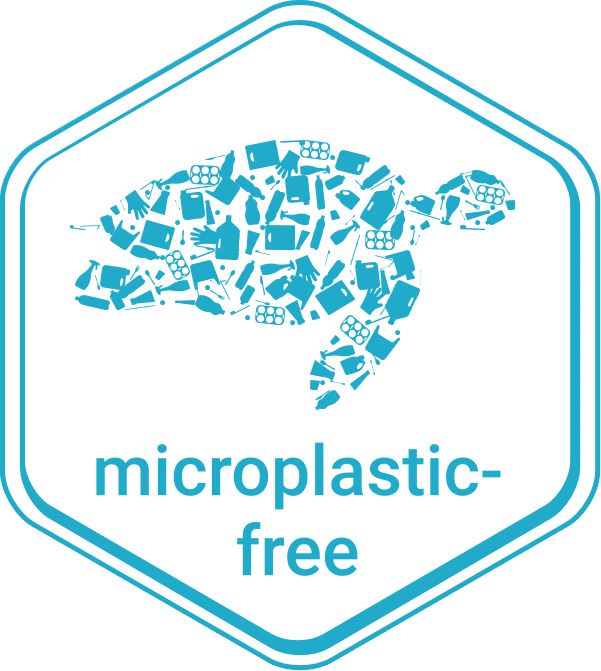Microplastic-free
Microplastic labels should serve as a guide when shopping. Many retail chains are therefore increasingly labeling their microplastic-free drugstore products with a corresponding microplastic seal.

However, the various microplastic labels define the term very differently. While some follow the BUND definition, other seals ban all types of plastic. There are also retailers who have their own definition of microplastics. However, almost all microplastic seals have one aspect in common. So-called bio-based polymers are generally not taken into account, so they may be used, although they also take decades to degrade or decompose in some cases. Both NABU and Deutsche Umwelthilfe are therefore calling for a ban on bioplastics that degrade poorly. In this context, people have even gone so far as to warn against the dangerous greenwashing of bioplastics. So far, however, only the Flustix microplastics seal is committed to a ban on bioplastics.
The INCI names of microplastics
Microplastics can be recognized in cosmetic products on the list of ingredients by the following INCI designations, among others:
- Acrylates Copolymer, Acrylates Crosspolymer
- Butylene/ethylene/styrene copolymer
- Ethylene/methacrylate copolymer
- Polymethyl methacrylate, polyacrylate, polyethylene (PE), polyquaternium
- Polyethylene Terephthalate (PET), Polypropylene (PP), Polystyrene (PS)
- Polytetrafluoroethylenes
- Polyurethane (PUR)
The European Commission's draft on limiting microplastics of August 30, 2022 (D083921/01)
The recently published EU draft implementing law includes almost all products containing microplastics: cosmetics and fragrances, biocides and even medical products. There are only a few exceptions: Pharmaceuticals, for example, but also in-vitro diagnostics. This means that many manufacturers will have to change the composition of their products. However, there are to be transitional periods for the entry into force of the resolutions. This should give producers enough time to develop suitable alternatives. For example, a transition period of four years is planned for microplastics in wash-off cosmetic products and five years for leave-on cosmetic products.
Microplastic-free certificate: Cosmacon now has its own microplastic-free certification
We at Cosmacon are aware of our responsibility for our environment and do not want to remain inactive on this important issue. That is why we now offer our own certification. For this certification, the raw materials are rigorously and critically examined by an independent safety assessor in accordance with the current EU definition or ECHA template. This microplastic seal offers you several advantages. You signal a sense of responsibility to your target group and can further enhance your image as a trustworthy brand. Furthermore, certified products are not just a trend, they are the future. The entire process only takes a maximum of ten working days and we only charge a one-off fee of 250 euros. Are you interested in guaranteed microplastic-free products that you can offer your target group? Please do not hesitate to contact us if you have any questions or require further information.
Microplastic-free? Yes, of course!
Microplastics are a very serious problem that pose a massive threat to our lakes, oceans and rivers. Everyone can already do something about this: by only buying products that are truly plastic-free. A glance at the INCI list is enough, especially as the names of the suspicious ingredients are easily memorized. We are also helping to ensure that our waters are not further threatened: with certification or a microplastics seal that is based on the strict requirements of the EU Commission. If we all work together, we can make a valuable contribution to protecting our environment.